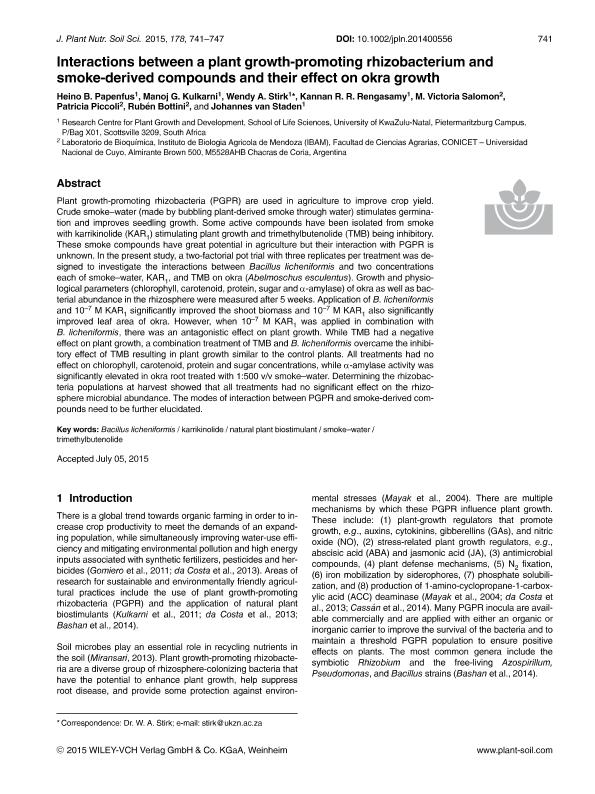Artículo
Interactions between a plant growth-promoting rhizobacterium and smoke-derived compounds and their effect on okra growth
Papenfus, Heino B.; Kulkarni, Manoj G.; Stirk, Wendy A.; Rengasamy, Kannan R. R.; Salomon, María Victoria ; Piccoli, Patricia Noemí
; Piccoli, Patricia Noemí ; Bottini, Ambrosio Rubén
; Bottini, Ambrosio Rubén ; van Staden, Johannes
; van Staden, Johannes
 ; Piccoli, Patricia Noemí
; Piccoli, Patricia Noemí ; Bottini, Ambrosio Rubén
; Bottini, Ambrosio Rubén ; van Staden, Johannes
; van Staden, Johannes
Fecha de publicación:
30/07/2015
Editorial:
Wiley VCH Verlag
Revista:
Journal Of Plant Nutrition And Soil Science-zeitschrift Fur Pflanzenernahrung Und Bodenkunde
ISSN:
1436-8730
Idioma:
Inglés
Tipo de recurso:
Artículo publicado
Clasificación temática:
Resumen
Plant growth-promoting rhizobacteria (PGPR) are used in agriculture to improve crop yield. Crude smoke–water (made by bubbling plant-derived smoke through water) stimulates germination and improves seedling growth. Some active compounds have been isolated from smoke with karrikinolide (KAR1) stimulating plant growth and trimethylbutenolide (TMB) being inhibitory. These smoke compounds have great potential in agriculture but their interaction with PGPR is unknown. In the present study, a two-factorial pot trial with three replicates per treatment was designed to investigate the interactions between Bacillus licheniformis and two concentrations each of smoke–water, KAR1, and TMB on okra (Abelmoschus esculentus). Growth and physiological parameters (chlorophyll, carotenoid, protein, sugar and α-amylase) of okra as well as bacterial abundance in the rhizosphere were measured after 5 weeks. Application of B. licheniformis and 10−7 M KAR1significantly improved the shoot biomass and 10−7 M KAR1 also significantly improved leaf area of okra. However, when 10−7 M KAR1 was applied in combination with B. licheniformis, there was an antagonistic effect on plant growth. While TMB had a negative effect on plant growth, a combination treatment of TMB and B. licheniformis overcame the inhibitory effect of TMB resulting in plant growth similar to the control plants. All treatments had no effect on chlorophyll, carotenoid, protein and sugar concentrations, while α-amylase activity was significantly elevated in okra root treated with 1:500 (v/v) smoke–water. Determining the rhizobacteria populations at harvest showed that all treatments had no significant effect on the rhizosphere microbial abundance. The modes of interaction between PGPR and smoke-derived compounds need to be further elucidated.
Archivos asociados
Licencia
Identificadores
Colecciones
Articulos(IBAM)
Articulos de INST.DE BIOLOGIA AGRICOLA DE MENDOZA
Articulos de INST.DE BIOLOGIA AGRICOLA DE MENDOZA
Citación
Papenfus, Heino B.; Kulkarni, Manoj G.; Stirk, Wendy A.; Rengasamy, Kannan R. R.; Salomon, María Victoria; et al.; Interactions between a plant growth-promoting rhizobacterium and smoke-derived compounds and their effect on okra growth; Wiley VCH Verlag; Journal Of Plant Nutrition And Soil Science-zeitschrift Fur Pflanzenernahrung Und Bodenkunde; 178; 5; 30-7-2015; 741-747
Compartir
Altmétricas



